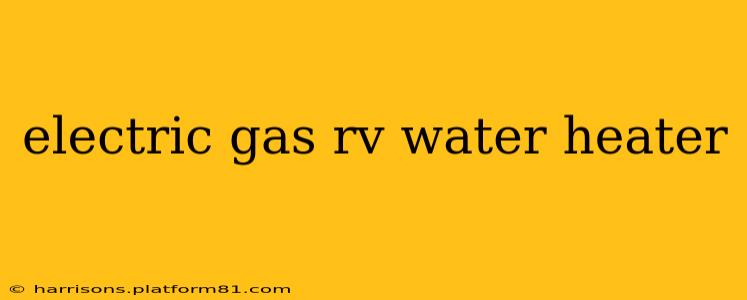Choosing the right water heater for your RV is crucial for comfortable camping. This guide explores electric/gas RV water heaters, comparing their features, pros and cons, and helping you make an informed decision. Whether you’re a seasoned RVer or a first-timer, understanding the nuances of these systems will significantly improve your travel experience.
How Does an Electric/Gas RV Water Heater Work?
Electric/Gas RV water heaters are hybrid systems offering the flexibility of both electricity and propane gas as heating sources. They typically operate on 120V AC power when plugged into a campsite or shore power. When off-grid, the propane gas burner takes over, ensuring hot water regardless of your location. The tank itself is insulated to retain heat and minimize energy loss. A thermostat regulates the water temperature, preventing overheating and ensuring consistent hot water.
What are the Pros and Cons of Electric/Gas RV Water Heaters?
Pros:
- Flexibility: The dual-fuel capability provides reliability whether you're hooked up to shore power or boondocking.
- Efficiency (potentially): Electric heating is generally more efficient when using shore power, while gas is a viable option off-grid. The overall efficiency will depend on your usage patterns and the efficiency of the specific model.
- Consistent Hot Water: With a sufficient propane supply and power connection, a consistent supply of hot water is generally ensured.
- Larger Capacity Options: Compared to purely electric models, you can find electric/gas water heaters with larger tank capacities.
Cons:
- Higher Initial Cost: These hybrid systems typically have a higher initial purchase price compared to purely electric or gas models.
- Complexity: The dual-fuel system adds complexity to the overall setup and troubleshooting potentially requires more expertise.
- Propane Management: Requires regular propane tank checks and refills, adding a layer of maintenance.
- Potential for Lower Efficiency (depending on usage): While versatile, the efficiency can vary significantly depending on your power source and water usage. Using gas off-grid can be less efficient than purely electric options when plugged into shore power.
What Size Electric/Gas RV Water Heater Do I Need?
The ideal size depends on the number of people using the water heater and your typical daily water consumption. Smaller RVs often suffice with 6-gallon tanks, while larger RVs or families might benefit from 10-gallon models. Consider your showering habits and other water usage (dishwashing, hand washing) when making your decision.
How Much Does an Electric/Gas RV Water Heater Cost?
The cost varies greatly depending on the brand, size, and features. Expect to pay anywhere from several hundred to over a thousand dollars. It's always best to compare prices from different reputable retailers before making a purchase.
How Long Does an Electric/Gas RV Water Heater Last?
With proper maintenance and care, an electric/gas RV water heater can last for many years—often 8-10 years or more. Regular flushing to remove sediment buildup significantly extends its lifespan.
How Do I Maintain My Electric/Gas RV Water Heater?
Regular maintenance is essential for optimal performance and longevity. This includes:
- Annual Flushing: Remove sediment buildup to improve efficiency and prevent damage.
- Anode Rod Check: Check and replace the anode rod as needed to protect the tank from corrosion.
- Inspecting for Leaks: Regularly check for any signs of leaks around fittings and connections.
- Propane System Check: Ensure the propane system is functioning correctly and that the tank is properly connected and filled.
Is an Electric/Gas RV Water Heater Right for Me?
The suitability of an electric/gas RV water heater depends on your camping style and needs. If you frequently boondock and need hot water off-grid, it's an excellent choice. However, if you primarily stay at campgrounds with shore power, a purely electric model might offer a more cost-effective solution. Carefully weigh the pros and cons and consider your specific usage pattern.
By carefully considering the factors discussed above, you can select the ideal electric/gas RV water heater that meets your needs and enhances your RVing experience. Remember to consult with RV specialists or experienced RVers for personalized advice tailored to your specific situation.
